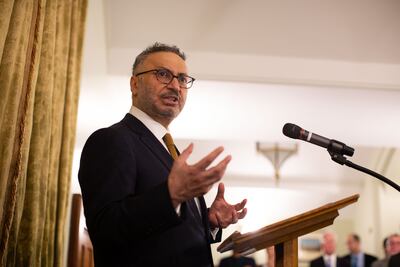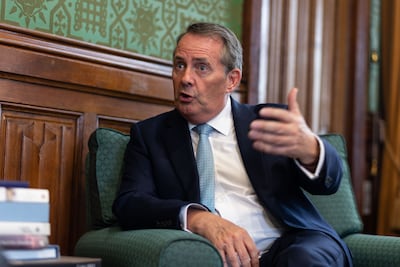As a former defence and trade secretary about to celebrate his 60th birthday, Liam Fox is one of the frontline UK politicians with greatest experience of all the countries that joined together to sign the Abraham Accords a year ago in Washington.
The head of the UK Abraham Accords Group, Mr Fox is fleshing out a vision for the agreements as a platform for international engagement at a new level. Before a ceremony to mark the anniversary of UAE, Bahrain and Israel signing the pact, Mr Fox said his work was building on the diplomatic deal sealed with great fanfare in the US capital.
“For the United Kingdom the benefits of this wonderful step forward were really threefold,” he said. “First of all, we are as a country, very strategically engaged in the Gulf. The Gulf is one of our biggest trading partners, after the United States and the EU, and a part of the world where we have a significant military presence.
“We in the UK want to make a very clear point about our commitment to the region but there's also a huge economic opportunity for the region. We see tremendous opportunities to combine the innovation and creativity that we see in the Israeli economy and also the UAE economy, combine that with the availability of capital in the UAE and Bahrain. It could be genuinely synergistic in a way that we have not seen in the past. What has to happen is that these accords have to be real, not just symbolic, not just diplomatic.
“For us as well as those directly involved it can't simply be an accord on paper – it needs to be an accord for business, for people and for security.”
Dr Anwar Gargash, diplomatic adviser to UAE President Sheikh Khalifa, told the gathering on the terrace of the Houses of Parliament that the assembly of the flags of the countries next to each other was a vivid symbol of the steps forward now happening under the Accords.

“Normalisation is not an event, it really is a process,” he said. “I see this developing even better as we see more trust being built, as we see more business being done, as we see a bigger network being established. We will see that this process will be in due course even more important than the event itself.
“We have so much more to do with this Accord. We want to see a two-state solution for the Palestinian people and for the Jewish people. We want to see an end to the cycle of violence that has brought so much suffering to both Israelis and Palestinians. The Abraham Accords have helped this goal by averting the proposed annexation. This was really the opportunity of signing the Accords and this was a key, key message when the UAE signed it.
“We want others in the region to see from the success of these Accords – the benefits of peace, the benefits of establishing relationships between Arabs and Israelis – we also want to break down the barriers of misunderstandings and stereotypes. We want to set the agenda of hope in front of our young people, and a largest population of the people in our region is young people, the message should be not forever conflict.”
James Cleverly, the UK's Minister of State for the Middle East, underlined Britain's support for the effort to bring people together to overcome long-standing divisions.
“It is the opening of a new chapter in good relations in the region and I hope that this will continue to expand, that we'll continue to see the normalisation of relationships between Israel and other countries in the Arab World and that we can all, including us here in the UK, reap the benefits from this, whether they be social, economic or diplomatic,” he said. “I'm very pleased that the UK was one of the first countries to publicly celebrate the Abraham Accords.”
“All the signatories to the Abraham accords really set about making this a meaningful relationship, opening new diplomatic missions, economic partnerships, travel, co-operation in technology, energy and climate change.
“It is fantastic to see and the UK is very keen to continue to play a part, supporting our good friends in the region and as they work more closely with each other.”
The UK minister said it was encouraging to see those living in the region breaking bread together, laughing and looking forward to a time of peace. The need for a breakthrough between the Israel and Palestinian leadership remains a vital consideration for all who support the new entente in the region. “It is through the dialogue, it is through joint working that we can avoid the kind of violence that we saw in May this year, which of course none of us would want to see again,” Mr Cleverly said.

Mr Fox has ambitions to broaden the international engagement, with economic progress underpinning the accords. “I'm acutely aware of the fact that nothing breeds success like success and if you want this accord to be seen to be succeeding then we have to have tangible benefits, larger economic benefits.
“I want to see how we can identify any gaps in economic and investment opportunities, specifically by identifying any non-tariff barriers to trade or regulatory impediments to investment that could be removed. Because if they can, then the market will come in and take that space.
“Greater human interaction always has its own positive knock on consequences,” he said. “You can see how the synergy of economic innovation and opening up of potential markets, plus the availability of capital, can all come together to produce a potentially very positive outcome. So, I'm very positive about that when I look at countries like Morocco and Sudan, who I think would be, you know, potential candidates to join - you can see just how quickly this could become a very influential grouping.”


